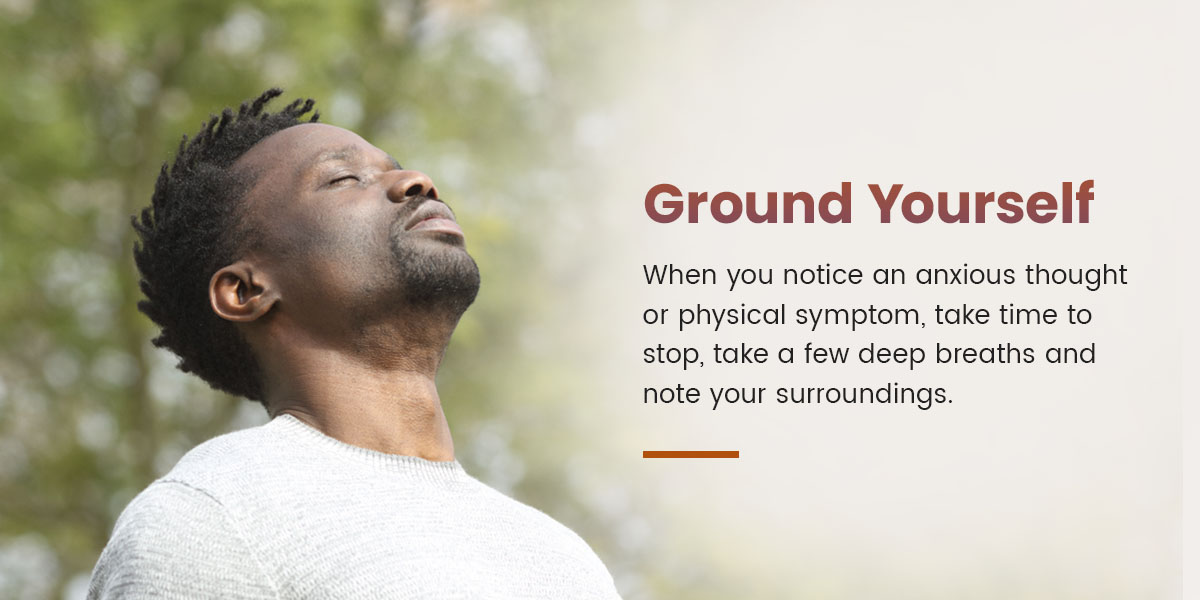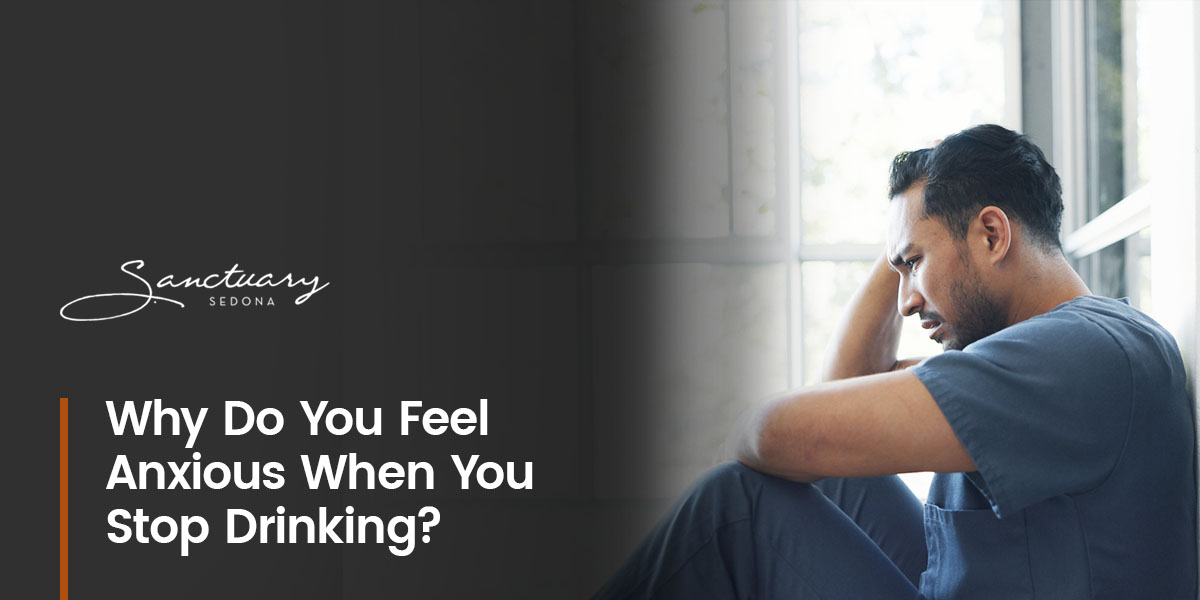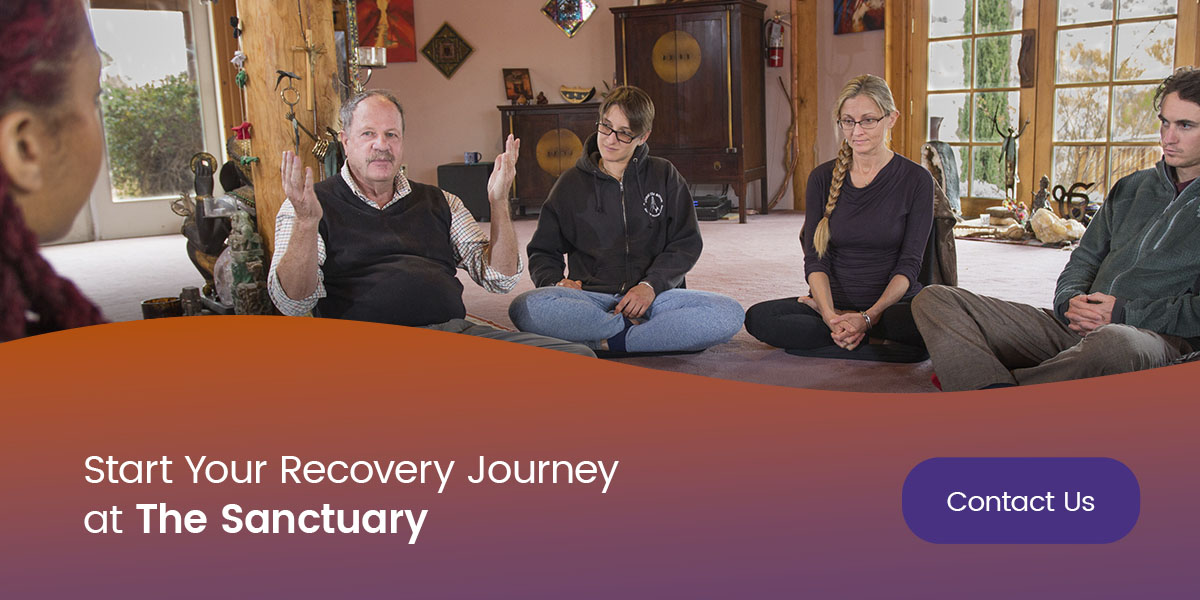Why Do You Feel Anxious When You Stop Drinking?
Anxiety is a common symptom after you stop drinking, and it can occur for a variety of reasons. As your brain and body adjust to the absence of alcohol, you might deal with withdrawal symptoms and heightened stress. And if you’ve turned to alcohol as a way to cope with stress and anxiety, you may be more vulnerable to these symptoms after quitting.
No matter the reason, this uncomfortable symptom can make it challenging to recover and feel better after you’ve made the courageous decision to end your relationship with alcohol. Fortunately, with some healthier coping mechanisms and a strong support system, you can enjoy a happier, healthier life without it.
Alcohol as a Coping Mechanism
Many people, intentionally or not, use alcohol to cope with mental health issues like anxiety. In fact, anxiety is one of the most common co-occurring conditions for alcohol use disorder (AUD).
While it may seem like alcohol quells symptoms in the short term, it can lead to an unhealthy cycle of dependence, worsened anxiety and alcohol use disorder (AUD) as a person consumes more alcohol over time. Anxiety is also a common hangover symptom. Using alcohol as a coping mechanism ultimately does more harm than good in the short and long term.
Why Does Quitting Make You Anxious?
Quitting alcohol can trigger anxiety because your body and brain get used to the depressive effects of alcohol. Over time, the nervous system can get worked up as it tries to adjust without alcohol. If you use drinking as a coping mechanism, quitting can also cause your anxiety to return at this vulnerable time.
Here’s a breakdown of why you may experience anxiety after quitting drinking:
Change in Brain Chemistry
When you stop drinking, your central nervous system (CNS) experiences a surge in activity as it returns to its normal state. More specifically, long-term alcohol use impacts GABA, a neurotransmitter that has a calming effect. When you stop drinking, the change in brain chemistry can lead to symptoms like anxiety, irritability and even panic attacks.
Withdrawal Symptoms
Alcohol withdrawal can trigger physical and psychological symptoms, from anxiety and irritability to insomnia and even seizures, depending on how severe your alcohol use is.
Post-acute alcohol withdrawal syndrome can also occur, leading to anxiety and other symptoms for months after detox. This often happens if you’ve been drinking heavily for a more extended period, causing your body to take longer to adjust without the substance.
Loss of a Coping Mechanism
If you’ve relied on alcohol to cope with stress or anxiety, quitting can leave you more vulnerable to experiencing these emotions. You might feel overwhelmed as you navigate stress without it, but developing healthier coping strategies like mindfulness and exercise can support your recovery and relieve anxiety from not drinking.
Increased Stress Response
When you quit drinking, your body’s stress response system can become more sensitive, leaving you susceptible to anxiety and other psychological symptoms as you heal.
How Long Does Anxiety Last After Quitting Alcohol?
Anxiety and other withdrawal symptoms can start within hours of your last drink and peak a day or two later before dissipating.
Anxiety can last for weeks or longer after quitting alcohol. Like other withdrawal symptoms, the impact on mood can depend on the amount and duration of your alcohol use. Light or moderate drinkers might notice a temporary, mild effect on their mood. Hangovers, for example, can cause anxiety for a few days, depending on how much you’ve had to drink and your body size or liver health.
However, anxiety is often more pronounced the longer you’ve been drinking since it will take longer for neurotransmitter systems to restore their balance in your body. Post-acute alcohol withdrawal syndrome can lead to anxiety, depression and sleep disturbances for months.
How to Manage Anxiety After Quitting Drinking
Fortunately, there are several ways you can manage your anxiety after you stop drinking. With a healthy routine and a strong support system, you can recover from the physical, emotional and psychological effects of AUD.
Accept the Anxiety
As you recover from AUD, be patient with yourself. Recognize that anxiety is common in recovery. It’s not a sign of failure, and it doesn’t mean you’ll feel this way forever. Sometimes, accepting these facts can make anxiety easier to handle.
Give yourself grace during this vulnerable time by taking care of yourself — take a nice warm bath, have a spa day, lose yourself in a good book or take a rejuvenating hike. Now is the time to pamper yourself and be more intentional about caring for your anxiety.
Get Active
Physical exercise can help you maintain your physical well-being, curb addiction cravings and even reduce anxiety. It doesn’t have to be intense — you might play a quick game of tennis or pickleball, swim, dance or another fun activity to get your mind off the anxiety and support better long-term health.
Ground Yourself
Mindfulness, yoga and meditation are all great ways to ground yourself or be more present to calm anxiety. When you notice an anxious thought or physical symptom, take time to stop, take a few deep breaths and note your surroundings.

The 5-4-3-2-1 method involves identifying a number of things you can see, touch, hear, smell and taste. For instance, you might spot five things in your surroundings, four things you can touch, three things you can hear, two things you can smell and one thing you can taste.
Try a Healthy Distraction
Sometimes, all we need is a quick and healthy distraction to distance ourselves from anxiety symptoms. This could be anything from going on a walk with a friend, seeing a movie, listening to a favorite song or doing a creative hobby like painting. Any healthy activity that fuels your spirit and takes your mind off your symptoms, even temporarily, can be an immense relief in your recovery journey.
Turn to Your Support System
Talking to a supportive friend or anyone you can trust during recovery can provide anxiety relief. You don’t even have to talk about the anxiety or ask for advice to start feeling better. You might call them up, go for a walk or try a fun activity with that person as you get the anxiety off your chest.
Seek Professional Support
Seeking professional help can give you the effective support you need, including anxiety treatment when you decide to quit alcohol. At The Sanctuary at Sedona, we offer holistic programs to heal your mind, body and spirit after you quit alcohol. An integrative approach can support a more profound, sustainable healing process, helping you overcome anxiety and the addiction cycle.
Start Your Recovery Journey at The Sanctuary
As your brain adjusts to a life without alcohol, you may experience anxiety. Several strategies can help you manage these feelings and live a healthier lifestyle. At The Sanctuary at Sedona, we can support your AUD recovery journey with holistic treatments, including professional detox, evidence-based therapies, dual-diagnosis treatments, bodywork and creative expression. We recognize that there isn’t a one-size-fits-all solution, so we use an integrative approach to help heal the mind, body, spirit and soul.
Take the next step in your recovery. Contact us today to learn more about our comprehensive treatment programs and how they can support your healing.


